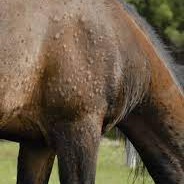Hives are common and they can be irritating for horses and frustrating for owners. With a range of possible triggers, treating hives and preventing future outbreaks can take a considerable amount of time and effort. This guide outlines what hives are, the causes of hives and how they can be treated and prevented.
What are Hives in Horses?
Hives in horses (also called urticaria) present as localised, flat, raised bumps on the skin – typically on the neck, shoulders, flanks and hindquarters. They can vary from a couple of centimetres in diameter to the size of a dinner plate and can be very irritating for your horse or simply a cosmetic frustration.
Hives are a clinical sign rather than a specific disease and are an allergic response to a foreign protein or compound (allergen) that your horse has been exposed to by injection, ingestion, skin contact or inhalation.
They can develop in as little as 15 minutes from exposure or up to 24 hours. Hives are generally self-limiting and usually last for a couple of hours once the trigger compound has been removed from the horse’s system.
What Causes Hives in Horses?
Hives can be triggered by a range of allergens, and identifying the cause of your horse’s hives is key to preventing them in the future. Hives can be caused by:
- Pollen
- Flies
- Insect stings
- Diet
- Administration / injection of certain medications
Other factors, such as stress, recent diet / routine change, intense exercise or temperature extremes may make horses more susceptible to hives.
Treating Hives in Horses
In some individuals, hives can be very irritating or itchy (a bit like nettle rash) and they can self harm through scratching, appear very restless and stressed or even show colic signs. In these (albeit uncommon) instances you should call your vet who will assess whether a corticosteroid injection is required.
Antihistamines are of limited benefit once the hives have developed although cold water soaks can relieve some of the discomfort.
Can Hives be Prevented?
Identifying the cause of hives in any particular individual can be time consuming and frustrating. It requires a process of elimination over time and because many horses aren’t particularly bothered by them, not that many cases are investigated in depth.
If the allergen is identified by elimination then minimising or eliminating the horse’s exposure will stop them happening again. A detailed assessment of a horse’s recent history may help to narrow down the list of possible allergens.
In recurrent or more severe cases, or in instances where eliminating exposure is impossible (pollen for example) allergy testing might be considered – this is either by intra-dermal skin testing or a blood sample – which can identify the most likely cause(s) and allow a course of immunotherapy to quieten the horse’s excessive response to the allergen.
This process involves regular injections of increasing amounts of allergen over a long period of time. Allergy treatment can take up to a year or more so requires a considerable degree of commitment on the owner’s part.
Avonvale Equine Vet Practice | Independent Equine Vet Practice
Avonvale Equine is an independent equine vet practice covering Warwickshire, Worcestershire, The Cotswolds and Northamptonshire. Our experienced and highly qualified equine vets offer a range of routine services, including diagnosis and treatment of skin conditions and allergies. We offer a free weekly zone visits scheme, which is ideal for routine appointments, and our in-house laboratory allows us to carry out routine and emergency tests with a fast turnaround time. Register your horse, pony, donkey or mule with us today.








